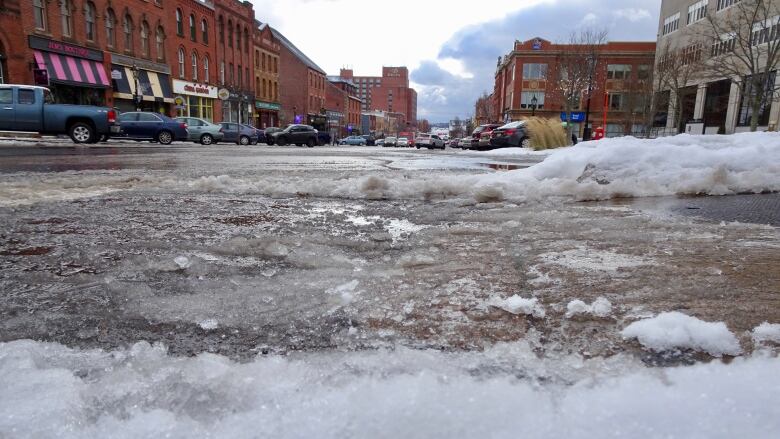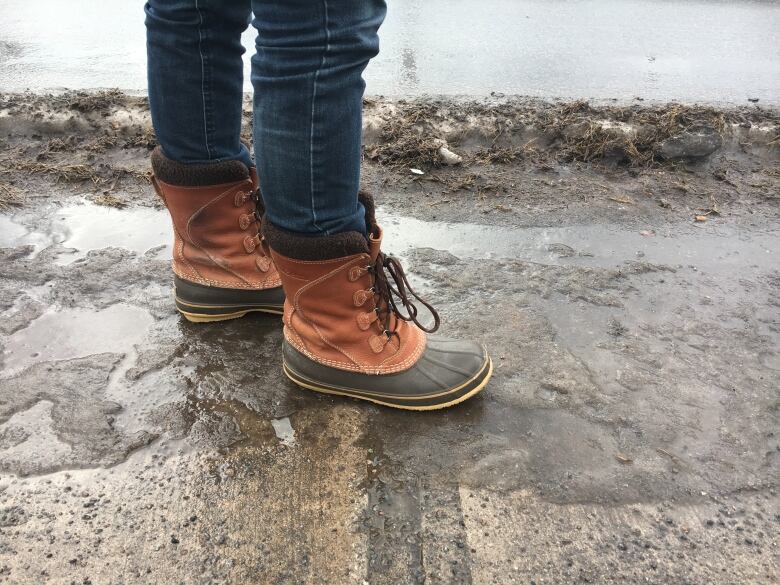How to prevent salt from damaging your pets, boots and automobiles
Tips to protect against salt on the roads and sidewalks

With the potential for an icy weekend after this week's storm, crews will be out and about salting the roads, sidewalks, parking lots and homes.
And while the salt helps melt ice and gets Islanders moving again, it does have some negative effects.
Here are some prevention tips to keep your car from rusting, your pets healthy and your footwear from being ruined.
Vehicles
Matt Thomson, general manager at Midtown Auto Repair and Tire in Charlottetown, says salt causes corrosion and rust on the underside of vehicles.
"Mainly we see the impact on the floor, the subframe, the heads of bolts, those kinds of areas," he says. "Essentially what it does is it slowly eats the body and the frame of your vehicle."

Salt doesn't affect tires but it can damage aluminum rims.
An annual rust proofing is the most common and effective type of prevention for salt, but it will only slow rusting, not completely eliminate it. Thomson recommends applying rust proofing every year, generally in the fall before the snow comes. Cars that are 10 years old or more are more likely to haverust damage, but he said you shouldn't wait that long to get your vehicle rust proofed.
"It's instantaneous," Thomson says."If you have a brand new vehicle, you should undercoat it before its first winter because it will start to do damage its first winter."
Repairs or replacements are possible depending on the type of rust damage and where it is, but sometimes that will be not as safe or too costly compared to getting a new vehicle. He also suggests that used car buyers get a car inspected underneath before buying a vehicle that's eight or more years old.
Pets
Marla Somersall, executive director of the P.E.I. Humane Society,says they strongly encourage people to use sand instead of salt around their home if they have cats or dogs. Salt gets into their paws and dries them out, she said.
"It can actually cause cracks and bleeding, and it can get up in between the pads on their feet. Between the cold and the salt, it can cause a lot of damage for pets' feet."

"The other piece is that dogs will lick because it's bothering themand so they're actually ingesting the salt and the chemicals that are in that and can cause themselves digestive problems and illness as well."
At the very least, Somersallsays you should wash their paws when they get back inside.
The best thing to do if you have pets on sidewalks or areas with salt is to have them wear booties or, if your pet doesn't like booties, apply a protective balm of your choice to their paws. Once you're back inside, you will want to wash off their paws. And as always, you want to be conscious of the temperature outside and how it's affecting your pets.
Footwear
Richard Meenink, owner-operator of Dr. Shoe in Charlottetown, says shoes and boots worn outside in the winter will eventually be ruined by salt if they're not cared for properly.
"Left alone, it can really destroy them," he says. "Footwear for the most part is either leather or vinyl, particularly boots, it basically will eat through the surface and either turn the leather crusty and harden it and swell it up, and the vinyl it damages the surface for the most part.

"It looks horrible but in the long run, it leaves it unusable."
Even if you've protected a boot or shoe, left overnight with wet and salt, given time that will eat through just about everything. Richard Meenink
There are different protector polishespeople can apply to their footwear the thicker the better, Meenink says. Many new shoes come with some protection but it doesn't hurt to apply more, particularly for leather shoes. Depending on use, you may need to apply additional protection or polish at the beginning of winter or as frequently as once a month.
The way to tell if you need to re-apply is to take a few drops of water and flick them on your boot, under the arch where it's not noticeable. If the water beads off, they're still protected, but if the water sinks in, you should re-apply. There are spray and past protectors available at shoe repair shops and online.
And, like pets, it's best to have something by the door to address the salt right away.
"I do tell my customers this time of year to keep a towel by the door where they come in for the day and if their boots are wet, the best thing you can do is dab them dry," he says. "Because even if you've protected a boot or shoe, left overnight with wet and salt, given time that will eat through just about everything."
Meenink says it's not hard to get white stains out from the salt, but if it eats through the surface so that it swells up and creates a ridge, that won't come out.
The best way to maintain your shoes and boots is to keep them dry and clean, and to apply some additional protection to them regularly.
- MORE P.E.I. NEWS |P.E.I. pathologist Pierre-Yves Daoust retires after 30 years
- MORE P.E.I. NEWS |Meet some of the Islanders working to keep the roads cleared












_(720p).jpg)


 OFFICIAL HD MUSIC VIDEO.jpg)
.jpg)



























































































